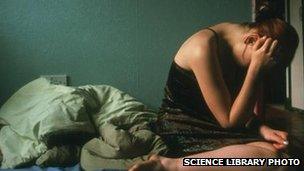Grooming victims 'still being failed', say MPs
- Published

There have been at least a dozen major investigations into child sexual exploitation in recent years
Victims of child sexual exploitation and street grooming are still being failed, despite a series of high-profile trials, MPs have said.
The Home Affairs Committee said exploitation was an increasing "large-scale nationwide problem".
It said police forces, social services and the Crown Prosecution Service must bear responsibility for failings.
The NSPCC called for "a culture change among police, CPS, the judiciary, and all child protection professionals".
There have been at least a dozen major criminal investigations into grooming in recent years, some of which are continuing.
The MPs began taking evidence on sexual exploitation and grooming after nine men from Rochdale were convicted in 2012.
Seven men are currently awaiting sentencing after being convicted last month of involvement in a major sex trafficking ring in Oxford.
The committee said that recent cases had typically involved large networks of Pakistani-heritage abusers who preyed on vulnerable white girls, although it added that this was just one form of sexual exploitation.
The MPs said: "Despite recent criminal cases laying bare the appalling cost paid by victims for past catastrophic multi-agency failures, we believe that there are still places in the UK where victims of child sexual exploitation are being failed by statutory agencies.
"The police, social services and the Crown Prosecution Service must all bear responsibility for the way in which vulnerable children have been left unprotected by the system."
'Failed twice'
The report said that social services directors around the country must take direct responsibility for properly investigating allegations. This must include ensuring that their staff treat exploited girls as victims, rather than collaborators who had given their consent to enter a life of sex trafficking and prostitution.
The committee singled out Rochdale and Rotherham councils, saying both had failed to grasp the seriousness of the problem.
The committee said that both councils had been "inexcusably slow" to realise what had been going on in their areas thanks "in large part to a woeful lack of professional curiosity".
The successful Rochdale trial had only gone ahead because the chief prosecutor for north-west England, Nazir Afzal, had overturned a previous decision to drop the case.
Labour MP Keith Vaz, chairman of the committee, said: "Officials who fail to act, for example in places like Rotherham or Rochdale, must not be allowed to evade responsibility through early retirement or resignation for other reasons and should not be paid compensation of any kind."
The MPs also backed the introduction of video-recorded cross-examination of child victims to make it easier for them to give evidence without being distressed by appearing before a live court session.
David Tucker, NSPCC head of policy, said: "The victims in recent child sexual exploitation cases were too often ignored or treated as troublemakers.
"There now needs to be a culture change among police, CPS, the judiciary, and all child protection professionals, so they better understand how grooming gangs operate, and how young people's behaviour could be a sign they are at risk of, or suffering, sexual exploitation."
He also called for "tougher action against predatory sex offenders who deliberately target the most vulnerable children, including sentences that reflect the seriousness of the crimes committed and act as a strong deterrent".
Barnardo's chief executive Anne Marie Carrie said: "Victims of child sexual exploitation are being failed twice, once by the failure to prevent them becoming victims in the first place and again by the failure to take swift action once that abuse has come to light."
She added: "In recent years there has been great progress in addressing this issue at a national and local level, but everyone coming into contact with vulnerable teenagers needs to remember that they are children too, and cannot consent to their own abuse."
'Patterns of abuse'
The MPs said there was a public perception that abusers were Asian and the victims were white - but it said the full picture was more complicated.
"There is no simple link between race and child sexual exploitation," said the report. "It is a vile crime which is perpetrated by a small number of individuals, and abhorred by the vast majority, from every ethnic group.
"Authorities should not focus on just one model of child sexual exploitation to the exclusion of others or they will become blinded to other patterns of abuse taking place.
"Stereotyping offenders as all coming from a particular background is as likely to perpetuate the problem as is a refusal to acknowledge that a particular group of offenders share a common ethnicity."
Labour's shadow crime and security minister, Diana Johnson, said no-one who read the committee's "truly shocking" report could be "in denial about the extent or horrific nature of child sexual exploitation in the UK".
"What is vital now is that these recommendations are not lost," she added, calling for "an expert-led review to produce clear and co-ordinated recommendations across government".
Peter Saunders, of the National Association of People Abused in Childhood, said: "This report does give me a bit of hope because it is actually insisting that the government act to make things happen.
"The other thing that struck me very very powerfully in the report was that they consider and they know that children are still in huge danger today and that some of these areas and the local authorities in these certain areas are not acting to protect our little ones and it's got to stop."
- Published24 May 2013
- Published15 May 2013
- Published15 May 2013